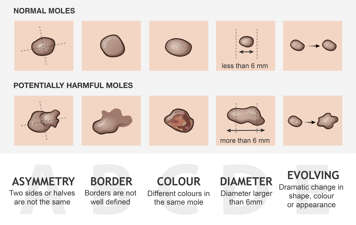What is malignant melanoma?
Malignant melanoma (say: muh-lig-nant mel-uh-no-ma) is cancer of the skin. It usually starts with a strange looking mole.
Your skin covers your whole body and is your main protection from infections. The skin also controls your body temperature by sweating.
Your skin contains a pigment (colouring) called melanin. This is what gives your skin its colour. Melanin is made by cells called melanocytes (say: mel-AN-oh-sites). When you are out in the sun, the melanocytes make more melanin and your skin gets darker. A mole (a dark spot on your skin) is a group of melanocytes that make a lot of melanin.
Melanoma is a cancer that comes from a mutation in a melanocyte. This mutation causes the melanocyte to divide out of control and form a growing lump on your skin that looks like an irregular mole. In malignant melanoma, the mutated melanocytes are cancerous. This means they can invade and destroy the normal skin cells around them and can spread to other parts of the body.
The main cause of melanoma in older people is UV rays from the sun. If you have blue eyes, light hair and light skin that burns easily, you are more likely to get melanoma as an adult. In many cases, teens get melanoma in places that have not been exposed to a lot of sun. Most of the time, it is not known why teens get melanoma. Always wear lots of sunscreen and long clothing to protect the skin from harmful UV rays.
How is melanoma diagnosed?
Doctors learn what type of cancer you have through a process called diagnosis.
First, the doctor or nurse will look at the mole and check it for these signs of melanoma.
- Asymmetry – two sides or halves of the mole are not the same
- Border - jagged or rough on the edges
- Colour - more than one colour in the same mole
- Diameter – a distance from one side of the mole to the other of more than 6 mm (the size of the eraser on a pencil)
- Evolving - dramatic change in shape, colour or appearance

You can remember these signs by remembering ABCDE. Moles with these signs are called "abnormal". If your mole is abnormal, the doctor or nurse will remove the mole and check to see if it has cancer cells in it. They may also do scans or tests to see if the cancer has spread to other parts of your body.
How is melanoma treated?
Your treatment for melanoma will depend on your diagnosis and whether the cancer has spread. Usually, melanoma is treated by removing the mole and some of the normal skin around it. Melanoma most commonly spreads to the lymph nodes. Your doctor may need to check your lymph nodes for melanoma. Some people may need to have some of their lymph nodes removed. If the cancer has spread, you may also need to have radiation or chemotherapy. You will learn more about treatment in the sections on cancer medications and cancer treatments and support therapies.
Prognosis for melanoma
Your doctor will probably talk to you and your family about a prognosis. A prognosis means the likelihood or chance that treatment will work and that you will recover or get better from cancer. Your prognosis will depend on how deeply your malignant melanoma has invaded the skin and whether it has spread to the lymph nodes or other parts of your body.
The best source of information about your cancer is your health-care team. If you have any questions or there is anything you do not understand about your cancer, ask your doctors and nurses. Your doctors and nurses want to help you understand your cancer.
If you are nervous about asking the doctors or nurses yourself, you can talk to your parent/caregiver. They may be able to answer your questions or help you ask questions of your health-care team.

